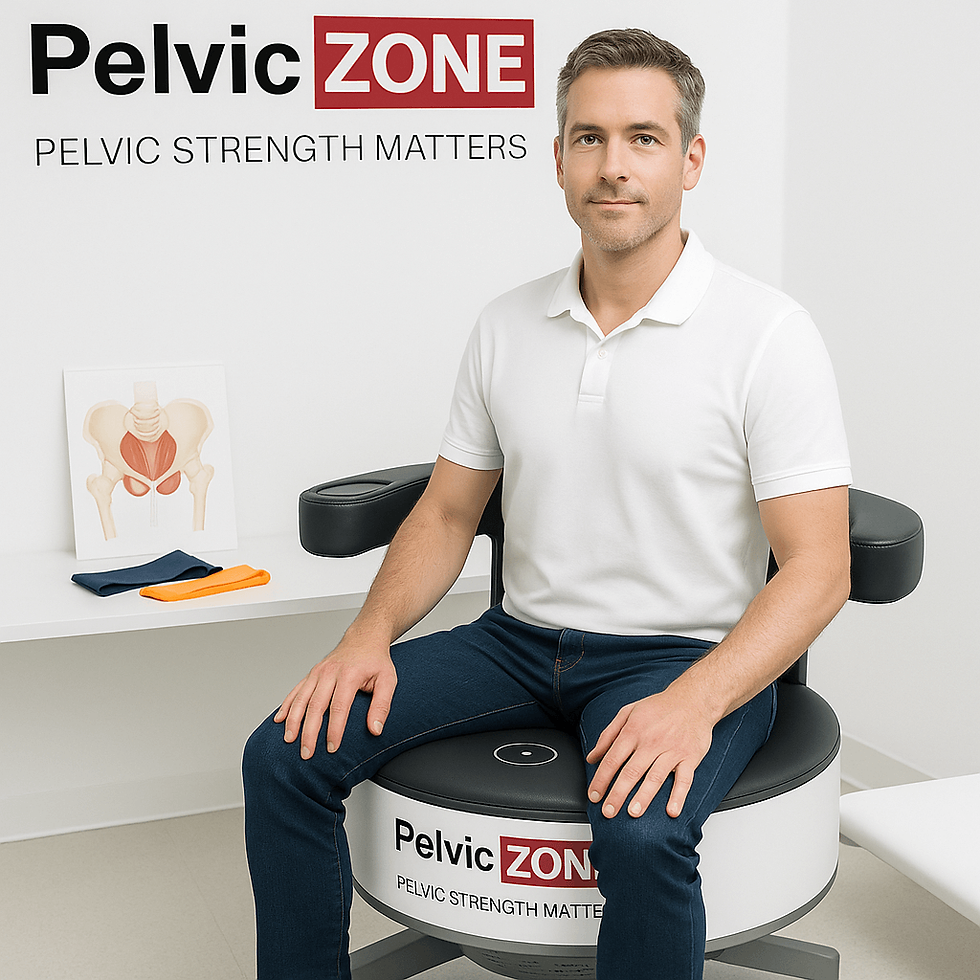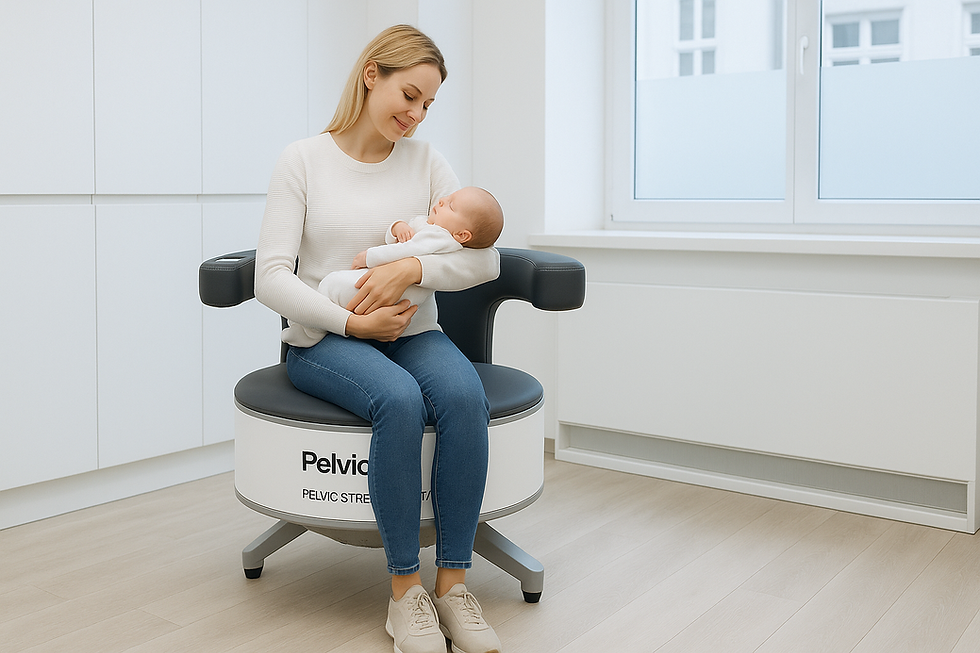Understanding Incontinence: Types, Causes & Solutions
- Team Pelvic Zone

- Aug 4, 2025
- 5 min read

Incontinence affects millions of people across the UK, yet it remains one of the most under-discussed health challenges we face. At Pelvic Zone, we've worked with thousands of clients who initially felt isolated and embarrassed by their condition, only to realise they're part of a much larger community seeking effective solutions.
The reality is that incontinence doesn't discriminate. Whether you're a new mum dealing with postpartum changes, navigating menopause, or recovering from medical procedures, understanding your condition is the first step towards regaining control and confidence.
What Exactly Is Incontinence?
Incontinence is the involuntary loss of urine or faeces, ranging from occasional minor leaks to complete loss of bladder or bowel control. We see clients who experience everything from a few drops when they laugh or sneeze to more significant challenges that impact their daily activities and social confidence.
The condition affects approximately 14 million people in the UK, with women being twice as likely to experience urinary incontinence compared to men. However, male incontinence is more common than many realise, particularly following prostate surgery or as men age.
The Different Types of Incontinence
Understanding which type of incontinence you're experiencing helps us create the most effective treatment approach. Here's what we commonly see in our clinic:
Stress Incontinence This occurs when physical pressure on your bladder causes leakage. We often work with clients who leak urine when they cough, sneeze, laugh, exercise, or lift heavy objects. It's particularly common among women who've given birth, as pregnancy and delivery can weaken the pelvic floor muscles that support the bladder.
Urge Incontinence Also known as overactive bladder, this involves a sudden, intense urge to urinate followed by involuntary loss of urine. Our clients describe feeling like they can't make it to the toilet in time, even when their bladder isn't full. This type often involves the bladder muscle contracting when it shouldn't.
Mixed Incontinence Many of our clients experience a combination of both stress and urge incontinence. This mixed type requires a comprehensive approach that addresses multiple underlying causes.
Overflow Incontinence This happens when the bladder doesn't empty completely, leading to frequent dribbling. It's more common in men, particularly those with prostate problems, but we also see it in women with certain medical conditions.
Functional Incontinence This occurs when physical or mental impairments prevent someone from reaching the toilet in time, despite having normal bladder function.
What Causes Incontinence?
Through our work with diverse clients, we've identified several key factors that contribute to incontinence:
Weakened Pelvic Floor Muscles The pelvic floor acts like a hammock, supporting your bladder, uterus, and bowel. When these muscles weaken due to childbirth, surgery, ageing, or lack of use, they can't provide adequate support. We see this frequently in our postnatal clients and those going through menopause.
Hormonal Changes Oestrogen helps maintain the strength of muscles around the bladder. During menopause, declining oestrogen levels can lead to weakened bladder control. We've helped many menopausal women regain confidence through targeted pelvic floor strengthening.
Pregnancy and Childbirth The weight of a growing baby puts pressure on the pelvic floor, and vaginal delivery can stretch and sometimes damage these crucial muscles. Even caesarean deliveries don't completely protect against pelvic floor changes, as pregnancy itself affects these muscles.
Prostate Issues For our male clients, prostate enlargement or prostate surgery can significantly impact bladder control. We've worked with many men following prostatectomy who thought their incontinence was permanent, only to see remarkable improvements with proper treatment.
Age-Related Changes As we age, bladder muscles can become less flexible, and the bladder's capacity may decrease. The muscles supporting the pelvic organs can also weaken over time.
Medical Conditions Diabetes, neurological disorders, chronic cough, and certain medications can all contribute to incontinence. We always work alongside your healthcare team to address underlying conditions whilst strengthening your pelvic floor.
Modern Treatment Approaches
The good news is that incontinence is highly treatable. Gone are the days when surgical intervention was the only option for severe cases. We've seen remarkable results with modern, non-invasive approaches.
Traditional Pelvic Floor Exercises Kegel exercises remain a cornerstone of treatment, but many people struggle to perform them correctly or consistently. We often find that clients have been attempting these exercises for months or years with limited success, simply because they're not engaging the right muscles effectively.
Revolutionary Magnetic Therapy At our clinic, we use cutting-edge magnetic field technology that provides what traditional exercises cannot. Our CE-certified medical device delivers up to 12,500 supramaximal contractions in just 28 minutes, targeting all three layers of pelvic floor muscles simultaneously.
This technology works by creating a focused magnetic field that stimulates muscle contractions much stronger than you could achieve voluntarily. The beauty of this approach is that you remain fully clothed and comfortable whilst your pelvic floor receives the equivalent of thousands of perfect Kegel exercises.
Lifestyle Modifications We also guide our clients through practical lifestyle changes that support their treatment. This includes bladder training techniques, dietary adjustments, and fluid management strategies that work alongside physical strengthening.
Addressing the Mental Impact We understand that incontinence affects more than just your physical health. The anxiety, embarrassment, and loss of confidence can be overwhelming. That's why we integrate neuroleadership coaching techniques into our approach, helping you overcome negative thought patterns and rebuild your self-assurance.
Why Choose Professional Treatment?
Many people attempt to manage incontinence alone, often limiting their activities and accepting a reduced quality of life. We've seen clients who stopped exercising, avoided social situations, or planned every outing around toilet locations. This doesn't have to be your reality.
Professional treatment offers several advantages. First, we can accurately assess your specific type of incontinence and create a personalised treatment plan. Second, our advanced technology provides results that are difficult to achieve through exercises alone. Third, we offer the privacy and discretion that many people need when addressing these sensitive issues.
Our 28-minute sessions fit into busy lifestyles, and many clients notice improvements after just one treatment. We've helped thousands across the UK regain their confidence and return to activities they love.
Taking the Next Step
If you're experiencing any form of incontinence, know that effective help is available. The sooner you address the issue, the better your outcomes are likely to be. We offer free trial sessions because we believe you should experience the treatment firsthand before making any commitments.
Our approach at Pelvic Zone combines proven technology with personalised care, ensuring you receive treatment that's both effective and comfortable. We're committed to helping you regain control, confidence, and quality of life without invasive procedures or lengthy recovery times.
Remember, incontinence is a medical condition, not an inevitable part of ageing or something you must simply endure. With the right treatment approach, most people can see significant improvement in their symptoms and return to living life on their terms.



Comments